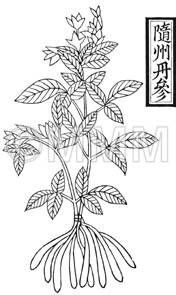Crude drug sample data base
※Click on the image to enlarge it.
Scientific information data base
| Common name | 丹参, Danshen, Salviae Miltiorrhizae Radix (JP18), Salviae Miltiorrhizae Radix et Rhizoma (CP2020), Salvia Miltiorrhiza Root (JP18), Danshen Root (CP2020) | ||||||
|---|---|---|---|---|---|---|---|
| Synonyms | 赤参 | ||||||
| crude drug image |
| ||||||
| Original plant name | Salvia miltiorrhiza Bunge, (Tanjin) | ||||||
| original plant image |
| ||||||
| Family name | Labiatae | ||||||
| Used part | root | ||||||
| Quality for selection | Good Danshen is thick. The internal is purple black with white spots shaped like chrysanthemum. (NI) | ||||||
| Official compendium | JP XVIII, CP (2020 ed.) | ||||||
| Clinical application | To promote blood circulation, stimulate menstrual discharge, relieve swelling and as a painkiller, danshen is applied for paramenia, stomachache, menopause, hyperemesis and stomachache of after childbirth, rheumatism. | ||||||
| Medical system | Traditional Chinese medicine | ||||||
| Drug effect in traditional medicine | Traditional classification | Drugs for invigorating blood circulation | |||||
| Beneficial effect | [Property and Flavor] Mild cold; bitter. [Meridian Tropism] Heart and liver. [Actions] To activate blood and eliminate stasis, unblock the meridian, relieve pain, clear the heart, relieve vexation, cool the blood and disperse abscesses. [Indications] Chest impediment, heart pain, pain in the epigastrium and abdomen, hypochondriac pain, aggregation and accumulation, painful heat impediment, insomnia caused by vexation, menstrual irregularities, dysmenorrhea and amenorrhea, sore, ulcer, swelling and pain. | ||||||
| Chemical constituent | Diterpenoids S. miltiorrhiza (*C1): Tanshinone I, Tanshinone IIA, Tanshinone IIB, Cryptotanshinone, Tanshinol I, Tanshinol II S. miltiorrhiza (*C2,C3,C5,C6): Danshenol A, Danshenol B, Dihydrotanshinone I, Cryptotanshinone, Tanshinone IIA, Danshexinkun A, Sugiol S. deserta (*C2,C3,C5,C6): 6,7-Dehydroroyleanone, Royleanone, 7-O-Methylhorminone, Taxodione, 7-O-Acetylhorminone, Horminone Phenylpropanoids S. deserta (*C3,C5,C6): Salvianolic acid K, Salviaflaside, Rosmarinic acid, Lithospermic acid B S. miltiorrhiza (*C4): Lithospermic acid B (Lithospermate B) | ||||||
| Chemical structure |
※画像をクリックすると、拡大して表示されます。 | ||||||
| Pharmacological effect | Improvement of spatial cognitive impairment, dilatation of coronary artery, protection of liver (lithospermic acid B),inhibition of aldose reductase,antifungal,endothelium dependent relaxation of the blood vessels (lithospermic acid B),improvement of kidney function (lithospermic acid B)(*E1,2),and elimination of free-radical(*E3). | ||||||
| DNA sequence | L14407; Traditioal Medical & Parmaceutical Database. | ||||||
| Classical reference (Chinese Herbal Classic "Zhenglei bencao") |  ※Click this image to see the actual image ※Click this image to see the actual image | ||||||
| Disease | Irregular menstruation, Menorrhalgia, Amenorrhea, Hyperemesis after childbirth, Anginal pain, Pain of lateral sides of trunk, Pyogenic dermatosis, Insomnia, Swelling and pain of joint | ||||||
| Formulation | rarely used in formula | ||||||
| Related drugs | Hongqinjiu (see "Remarks") | ||||||
| References | JP18: The 18th edition of the Japanese Pharmacopoeia. CP2020: Pharmacopoeia of the People's Republic of China 2020 edi. C1) The Encyclopedia of Wakan-Yaku with Color Pictures Vol. I, pp 24-25. C2) Chem.Pharm.Bull.,45,564(1997). C3) Chem.Pharm.Bull.,45,1306(1997). E1) Chem.Pharm.Bull.,36,316(1988). E2) Nat.Med.,51,287(1997). E3) Experimental & Toxicologic Pathway,47,341(1995). | ||||||
| Remarks | "Hongqinjiao" is the roots of Salvia przewalskii Maxim., congener of "Danshen" (= S. miltiorrhiza Bunge). It is used to treat rheumatism, to promote blood circulation and remove blood stasis. It is sometimes distributed as Danshen in Chinese market. In Japan, the roots of S. paramiltiorrhiza H. W. Li & X. L. Huang and S. sinica Migo are also circulated in the market as well as S. miltiorhiza. | ||||||
| Last renewal date | 2021/09/27 | ||||||



















